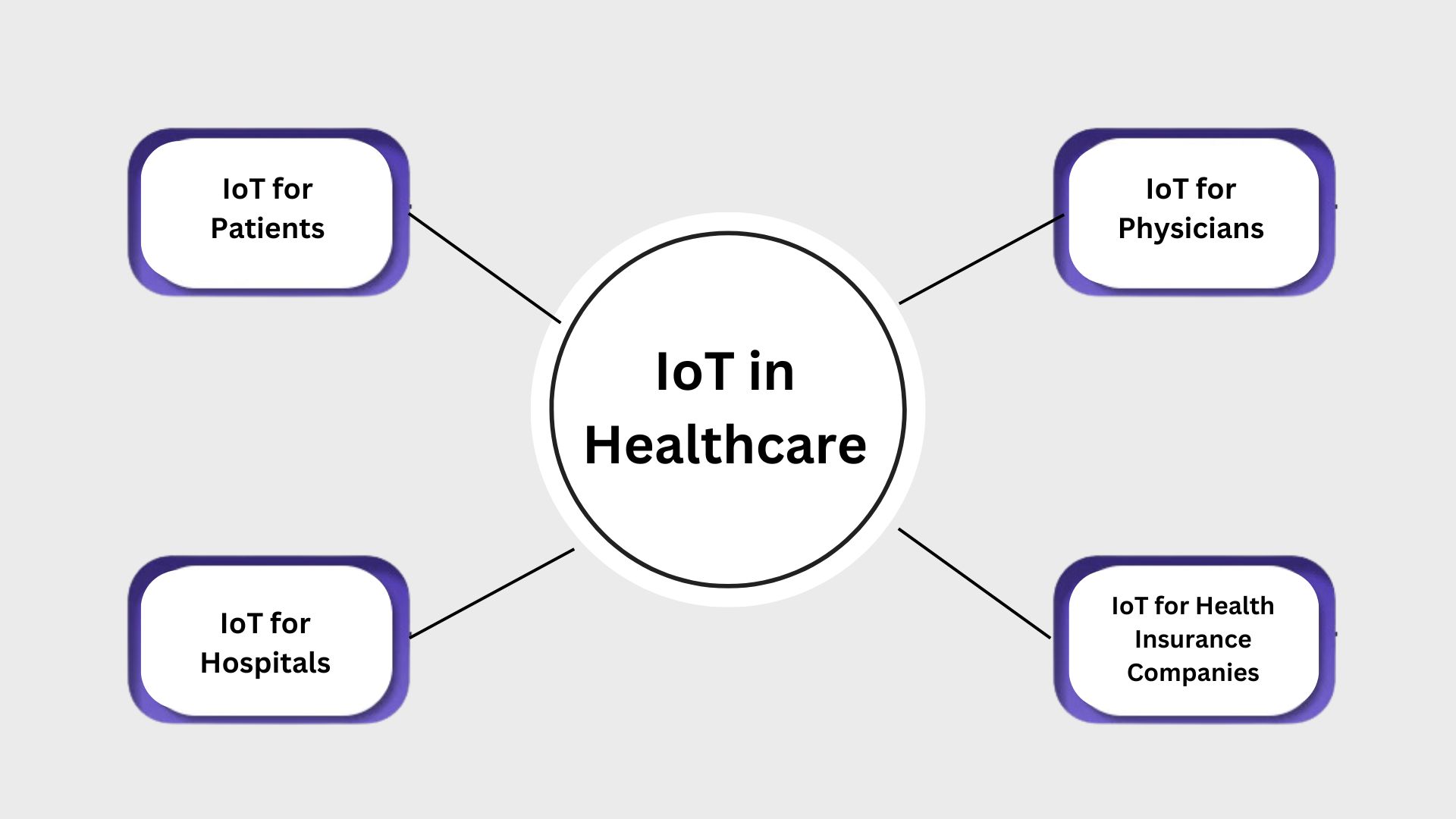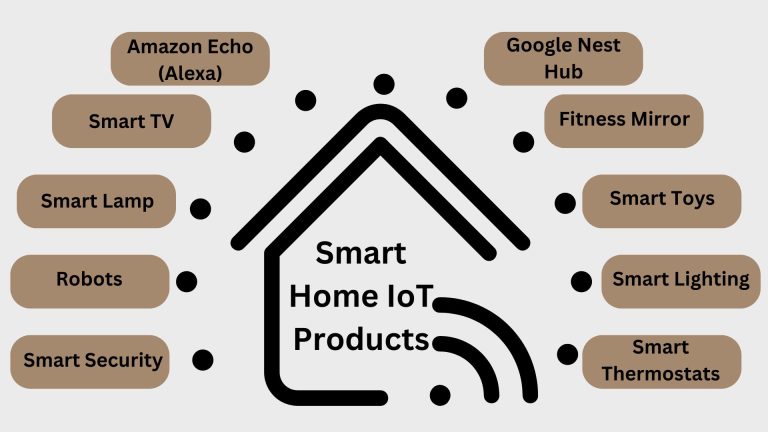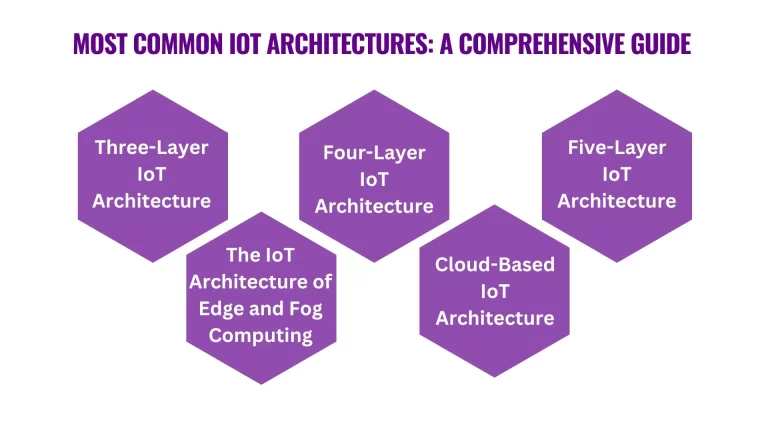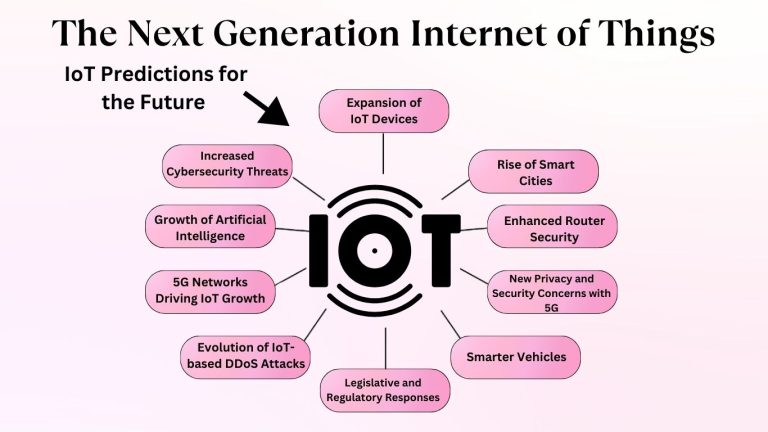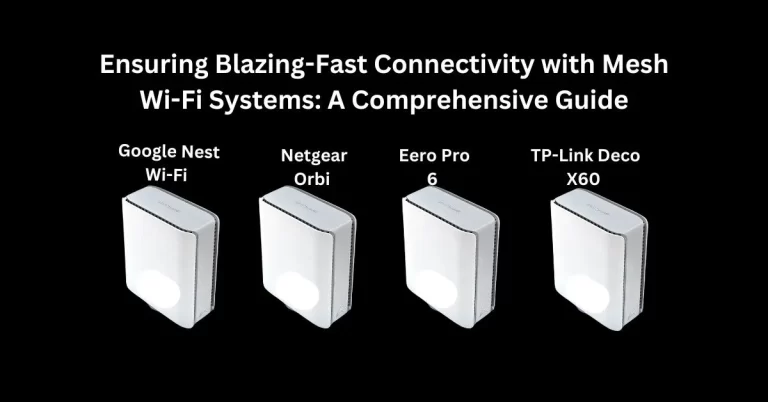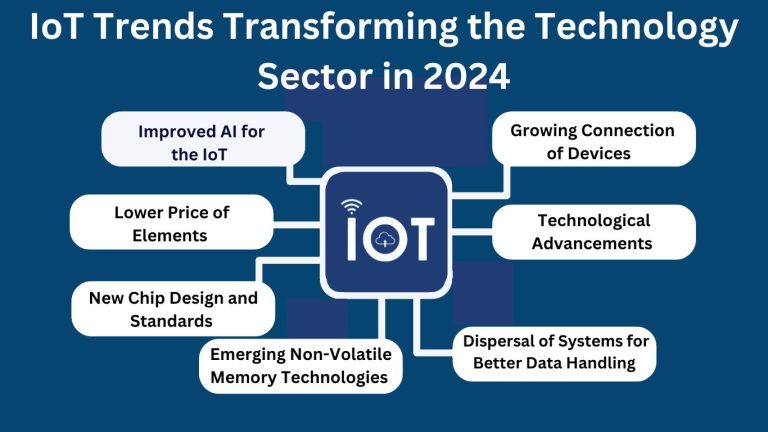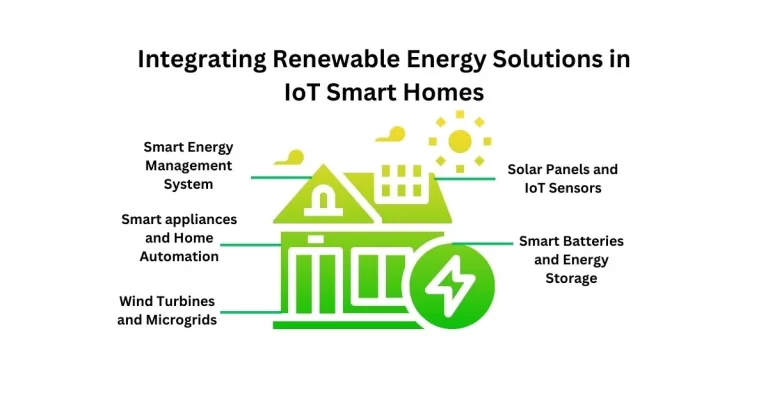IoT in Healthcare : Unstoppable Innovations Shaping the Future of Health
The use of IoT in healthcare is transforming patient care in ways we never imagined . The IoT healthcare market is expected to grow beyond $300 billion by the year 2028 with a yearly growth rate of approximately 18.12%.
This technology is helping healthcare providers to offer more effective and preventive care by checking the patient’s vital signs and tracking medical equipment. IoT in Healthcare is most Trending Topic in Current Era.
This blog focuses on discussing the details of IoT in healthcare; it also outlines IoT’s main benefits and drawbacks. Before the emergence of IoT, patient’s communication with doctors was limited to face-to-face consultations and occasional (rarely) telephonic conversations. It was not possible to monitor patients’ health status continuously by doctors or hospitals, which made a timely recommendation beyond their capacity.
The use of IoT in Healthcare-enabled devices has made remote health monitoring in the medical sector a reality. This could go a long way in improving not only patient care but the welfare of the patients as well as enable the physicians to diagnose and suggest their best. Also, it has enhanced the communication between the patients and the health care providers and improved the satisfaction of the patients. Telemonitoring is also useful in the reduction of hospitalization and hospital readmissions.
IoT in healthcare is changing the way devices engage with the population to offer healthcare solutions accordingly transforming the healthcare sector. It is used by/among patients, families, physicians, hospitals, and even insurance companies.
IoT In Healthcare Trends From ( 2010 To 2024)
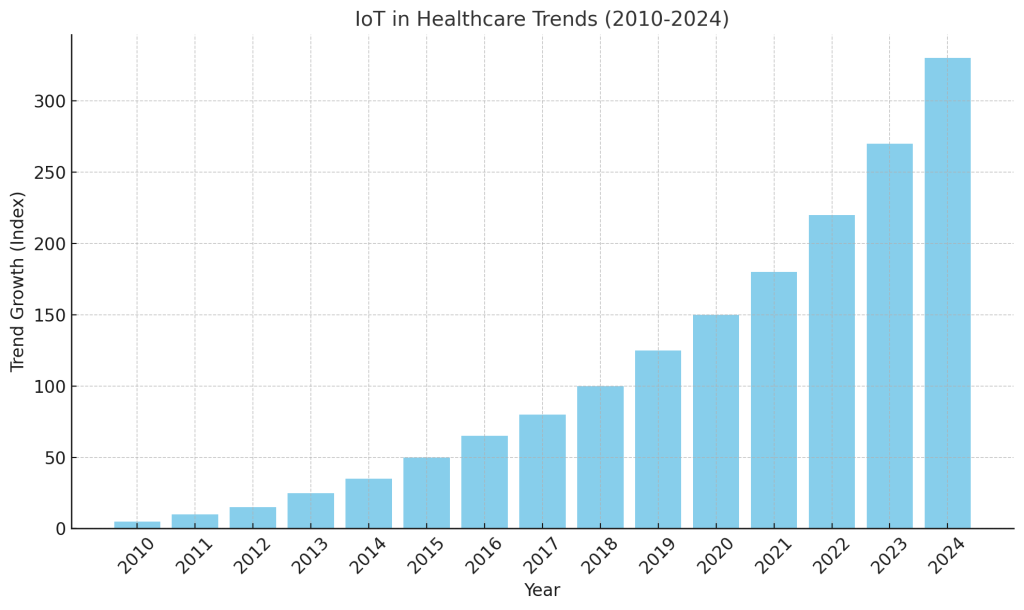
What is IoT and Why is it Important IoT in Healthcare?
Internet of Things is the term that describes the connection of physical devices applied in all categories of appliances and using its tech gadgets for a mini global connected network. These devices can get and share information and create an IoT system that allows communication between these devices, as well as with internet-based services.
Top 20 IOT in Healthcare APPS , Products , Projects
IoT for Patients
Smart mechanisms like fitness trackers and smart tools like blood pressure monitors and glucometers offer patients personalized care. Some of these gadgets can monitor different health parameters including diet, physical activity, and signs like temperature and blood pressure, or even send out alerts for appointments or prescriptions. The patients in the elderly category reap big from IoT technology since their health status can be closely monitored. In case of serious condition, the system can send notifications to the families or the doctors to provide comfort in terms of health. if we are talking about IoT in healthcare IOT Patients App always will play Important Role in Healthcare
Top 20 IOT in Healthcare Apps For Patient .
Headspace
guide you through meditation, this will help you reduce stress and improve sleep.
Epocrates
This is specified for Doctors easy access to drug details and treatment guidelines.
MyFitnessPal
You can track Keep your meals and workouts with help of this App .
Cerner (Oracle)
A platform that allow doctors and patient via telehealth service.
Epic MyChart
With the help of this app get you health info, schedule visits, and chat with your doctor.
Dexcom G6
A real-time glucose monitoring tool that helps you with diabetes keep their blood sugar levels in check.
AliveCor KardiaMobile
A portable ECG monitor that lets you track your heart health and detect irregularities in real time.
Google DeepMind Health
Uses cutting-edge AI to help doctors diagnose and manage patient care more accurately.
IBM Watson Health
Leverages AI to assist in making better clinical decisions and offers tailored treatment options.
Fitbit
A wearable device that tracks your activity, heart rate, and sleep to keep you fit and healthy.
MySugr
A friendly diabetes management app that helps you log your sugar levels and manage your insulin.
Hello Heart
Monitors your heart health and offers tips to keep your blood pressure in check.
Cardiogram
Turns your smartwatch into a heart monitor, spotting conditions like atrial fibrillation.
Calm
Provides relaxation exercises, sleep stories, and meditation sessions to help manage stress.
Youper
An AI-based mental health companion that helps you track your mood and offers emotional support.
Wysa
A mental health app that uses AI to provide supportive conversations and personalized therapy tools.
Ada Health
A symptom checker that asks questions and provides personalized health insights.
Babylon Health
An app offering medical advice, symptom checking, and virtual doctor consultations.
K Health
Puts healthcare in your hands with personalized health advice and access to online doctors.
Teladoc
Provides virtual consultations with doctors, making healthcare more accessible from anywhere.
IoT for Physicians
if we are talking about IoT in healthcare Wearable devices and home monitoring systems that are based on IoT are used by physicians to monitor their patient’s health more efficiently. Such devices enable the healthcare providers to assess the extent of compliance with treatment regimens and when urgent medical assistance is required. Technology allows for early intervention thus helping physicians make the right decisions and deliver precise care. The information gathered through the IoT devices assists doctors in the right approach to adopt in the treatment process to get the intended results.
Top 11 IOT in Healthcare Apps For Physicians
Epocrates
A go-to app for doctors to quickly look up drug details, treatment guidelines, and make better decisions for their patients.
Doximity
A networking tool that lets doctors connect with colleagues, share important medical insights, and even manage telemedicine appointments.
Figure 1
A cool app where doctors can view and discuss real-life medical cases, learning from the experiences of fellow healthcare professionals worldwide.
UpToDate
This app helps doctors stay updated with the latest medical knowledge, offering quick access to trustworthy information for better patient care.
VisualDX
A visual tool that helps doctors identify diseases and narrow down diagnoses with detailed images and guidance.
Amion
A lifesaver for doctors’ schedules, helping them organize shifts and on-call duties, making team coordination smoother and less stressful.
PEPID
An all-in-one app offering drug info, dosage calculators, and diagnostic support to help doctors provide faster, more accurate treatments
Medscape
Keeps doctors in the loop with medical news, case studies, and educational resources, all in one place.
RescueTime
A helpful time-tracking app that allows busy doctors to manage their time more effectively, balancing their workload better.
Docphin
Simplifies access to medical research, delivering relevant studies and journal articles right to a doctor’s feed to stay informed without the hassle.
Docphin
Simplifies access to medical research, delivering relevant studies and journal articles right to a doctor’s feed to stay informed without the hassle.
IoT for Hospitals
In hospitals, these devices present many advantages beyond the tracking of customer’s health status. Wearable sensors placed on connected gadgets can monitor the present position of medical tools like wheelchairs, defibrillators, oxygen pumps and other important tools. It also helps in monitoring the staff and patient traffic within the hospital, which is very crucial for the proper running of the hospital. In addition, hygiene monitoring devices also decrease the probability of infections; through the use of IoT devices, smart systems aid in tracking assets including pharmacies through inventory controls and environmental control among other factors. If we are talking about IoT in Healthcare we will remember Product for hospital
Top 20 IOT in Healthcare Apps For Hospitals .
Epocrates
A go-to app for doctors to quickly look up drug details, treatment guidelines, and make better decisions for their patients.
Doximity
A networking tool that lets doctors connect with colleagues, share important medical insights, and even manage telemedicine appointments.
Figure 1
A cool app where doctors can view and discuss real-life medical cases, learning from the experiences of fellow healthcare professionals worldwide.
UpToDate
This app helps doctors stay updated with the latest medical knowledge, offering quick access to trustworthy information for better patient care.
VisualDX
A visual tool that helps doctors identify diseases and narrow down diagnoses with detailed images and guidance.
Amion
A lifesaver for doctors’ schedules, helping them organize shifts and on-call duties, making team coordination smoother and less stressful.
PEPID
An all-in-one app offering drug info, dosage calculators, and diagnostic support to help doctors provide faster, more accurate treatments
Medscape
Keeps doctors in the loop with medical news, case studies, and educational resources, all in one place.
RescueTime
A helpful time-tracking app that allows busy doctors to manage their time more effectively, balancing their workload better.
Docphin
Simplifies access to medical research, delivering relevant studies and journal articles right to a doctor’s feed to stay informed without the hassle.
Cerner (Oracle Health)
A powerful platform that connects patient records, telehealth, and management tools to help hospitals run more smoothly and deliver better care
Epic Systems
A hospital favorite for managing everything from patient records to appointments, making it easier for staff and patients to stay connected.
Philips IntelliVue Guardian
This system tracks patients’ vital signs and sends alerts in real-time, helping hospital staff catch health issues before they become serious.
Medtronic Care Management Services
Helps hospitals keep an eye on patients remotely, especially those with chronic conditions, after they leave the hospital.
GE Healthcare Centricity
Combines medical imaging with patient data, streamlining diagnostics and ensuring that hospital teams have all the information they need.
AirStrip
This app allows doctors and nurses monitor patients health remotely using their phones, and will get real time access on vitals.
QardioMD
With the help of this track racks patients’ heart rates Remotely
Capsule Technologies
With the help of this Gathers data from medical devices and feeds it into hospital Management systems, Will provide Hospital teams real-time updates on patient conditions.
Teladoc Health
A telemedicine app that makes it easy for hospitals to offer virtual consultations, so doctors can see patients Online.
Spok Mobile
With the help of this Messaging app staff communicate quickly especially in emergencies
Internet of Things for Health Insurance Companies
As connected devices become a part of the Internet of Things, health insurance companies have tremendous prospects. The information gathered from the health monitoring devices improves the insurer’s underwriting and claims management. This data assists in the identification of fake claims and enhances the accuracy of risk evaluation. Insurance companies can foster transparency with their customers throughout the processes of pricing, claims handling and decision-making with this connected technology. This way, both the insurers and the customers can have a better understanding of the reasons behind insurance decisions based on the data collected.
In healthcare, IoT-based systems are always collecting the data of the patients and incorporating the input of the doctors. One of the examples of this technology is the continuous glucose monitoring systems used in insulin pens and it provides real-time data for improved patient care.
All these connected healthcare devices can be interconnected and they can alert each other to take necessary action which may include saving lives. These devices gather important data and then transmit the information to the cloud where the health care professionals can respond to it.
The possibilities of IoT usage in healthcare are numerous, increasing patient well-being, increasing the efficiency of healthcare employees and increasing the efficiency of hospital processes.
Redefining Healthcare
The emergence of new IoT products in the healthcare sector is much faster, and the availability of large amounts of data from connected devices can dramatically change health care.
It has a four-layer architecture where each layer is integrated to make sure that the data collected in one level is processed and forwarded to the next level and valuable information is generated for dynamic business decisions.
- Step 1: The first step is to install smart interconnected devices including sensors, actuators, monitors, detectors and camera systems that gather the right data.
- Step 2: Data gathered from these devices is normally in analog form and therefore must be collected, summed up, and digitized for further analysis.
- Step 3: The digitized data is then pre-processed, normalized and then transferred to a data center or cloud.
- Step 4: The last and final process is the one that entails the management and analysis of the data that has been collected. Sophisticated analysis performed on this data enables decision-makers (stakeholders) to obtain useful knowledge for decision-making.
IoT is exposed to enhance the quality of care, treatment efficacy and cost-effectiveness for patients in the healthcare system. At the same time, the healthcare providers experience optimization of the processes, increased performance and better patient satisfaction.
Pros and Cons of IoT in Healthcare
Pros of IoT in Healthcare
The use of IoT in healthcare offers numerous advantages, such as:
- Cost Reduction: Telemonitoring decreases the frequency of patient’s clinic visits and emergency department visits, hospitalizations, and rehospitalizations, which is a great cost-effective.
- Improved Treatment: IoT enables doctors to make informed decisions thereby enhancing the transparency of the treatment process.
- Faster Disease Diagnosis: Real-time monitoring and data acquisition assist in early diagnosis of diseases or even their prevention based on signs and symptoms.
- Proactive Treatment: Health monitoring in real-time means that, before the situation gets worse, medical assistance/help is provided.
- Management of Drugs and Equipment: Through the use of IoT, medical supplies and equipment are well utilized thus cutting costs of purchasing new ones.
- Error Reduction: The data collected from IoT helps in decision-making and also helps in avoiding errors, wastage and costs in the healthcare system.
Cons of IoT in Healthcare
However, some issues are associated with IoT in healthcare, the most significant of which is the issue of data security. IoT devices collect a huge amount of data, most of which is confidential, therefore, a need to ensure adequate security measures are in place. In a world that is becoming more interconnected, the ability to fully harness this digital muscle will be a major competitive challenge.
Summary: The Opportunities of IoT in HealthCare
The Internet of Things is a rapidly growing trend with enormous potential for the healthcare industry, which promises to bring significant changes in the ways patients are treated, as well as increase the effectiveness and efficiency of the healthcare system. Through real-time patient tracking, efficient communication between devices, and timely decision-making, it is revolutionizing healthcare systems beyond expectations. Since the IoT healthcare market is expected to reach $300 billion and beyond by 2028, its effects will remain apparent as it creates value for patients, doctors, healthcare facilities and insurance providers. However, there are issues like the security of data that need to be solved, but the advantages of it in healthcare are numerous and include such aspects as the reduction of costs, the improvement of treatments, the increase in the speed of disease diagnosis, and the optimization of work processes. With the integration of the healthcare industry, it will be a vital aspect to unlock the use of IoT to remain competitive in the emerging/developing medical field.
Best AI Applications For Diagnosis In Health Care

